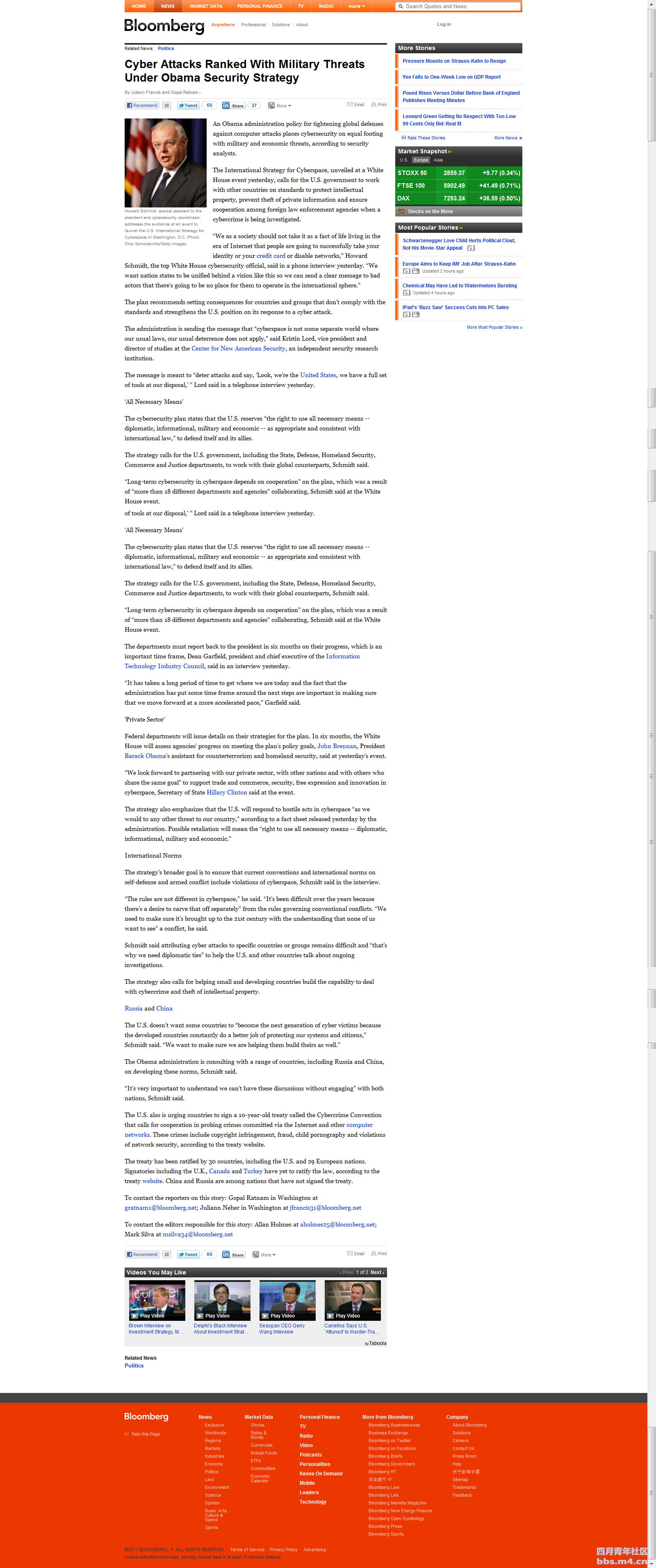|
|
http://www.bloomberg.com/news/20 ... obal-standards.html
Cyber Attacks Ranked With Military Threats Under Obama Security Strategy
By Juliann Francis and Gopal Ratnam -
An Obama administration policy for tightening global defenses against computer attacks places cybersecurity on equal footing with military and economic threats, according to security analysts.
The International Strategy for Cyberspace, unveiled at a White House event yesterday, calls for the U.S. government to work with other countries on standards to protect intellectual property, prevent theft of private information and ensure cooperation among foreign law enforcement agencies when a cybercrime is being investigated.
“We as a society should not take it as a fact of life living in the era of Internet that people are going to successfully take your identity or your credit card or disable networks,” Howard Schmidt, the top White House cybersecurity official, said in a phone interview yesterday. “We want nation states to be unified behind a vision like this so we can send a clear message to bad actors that there’s going to be no place for them to operate in the international sphere.”
The plan recommends setting consequences for countries and groups that don’t comply with the standards and strengthens the U.S. position on its response to a cyber attack.
The administration is sending the message that “cyberspace is not some separate world where our usual laws, our usual deterrence does not apply,” said Kristin Lord, vice president and director of studies at the Center for New American Security, an independent security research institution.
The message is meant to “deter attacks and say, ‘Look, we’re the United States, we have a full set of tools at our disposal,’ ” Lord said in a telephone interview yesterday.
‘All Necessary Means’
The cybersecurity plan states that the U.S. reserves “the right to use all necessary means -- diplomatic, informational, military and economic -- as appropriate and consistent with international law,” to defend itself and its allies.
The strategy calls for the U.S. government, including the State, Defense, Homeland Security, Commerce and Justice departments, to work with their global counterparts, Schmidt said.
“Long-term cybersecurity in cyberspace depends on cooperation” on the plan, which was a result of “more than 18 different departments and agencies” collaborating, Schmidt said at the White House event.
The departments must report back to the president in six months on their progress, which is an important time frame, Dean Garfield, president and chief executive of the Information Technology Industry Council, said in an interview yesterday.
“It has taken a long period of time to get where we are today and the fact that the administration has put some time frame around the next steps are important in making sure that we move forward at a more accelerated pace,” Garfield said.
‘Private Sector’
Federal departments will issue details on their strategies for the plan. In six months, the White House will assess agencies’ progress on meeting the plan’s policy goals, John Brennan, President Barack Obama’s assistant for counterterrorism and homeland security, said at yesterday’s event.
“We look forward to partnering with our private sector, with other nations and with others who share the same goal” to support trade and commerce, security, free expression and innovation in cyberspace, Secretary of State Hillary Clinton said at the event.
The strategy also emphasizes that the U.S. will respond to hostile acts in cyberspace “as we would to any other threat to our country,” according to a fact sheet released yesterday by the administration. Possible retaliation will mean the “right to use all necessary means -- diplomatic, informational, military and economic.”
International Norms
The strategy’s broader goal is to ensure that current conventions and international norms on self-defense and armed conflict include violations of cyberspace, Schmidt said in the interview.
“The rules are not different in cyberspace,” he said. “It’s been difficult over the years because there’s a desire to carve that off separately” from the rules governing conventional conflicts. “We need to make sure it’s brought up to the 21st century with the understanding that none of us want to see” a conflict, he said.
Schmidt said attributing cyber attacks to specific countries or groups remains difficult and “that’s why we need diplomatic ties” to help the U.S. and other countries talk about ongoing investigations.
The strategy also calls for helping small and developing countries build the capability to deal with cybercrime and theft of intellectual property.
Russia and China
The U.S. doesn’t want some countries to “become the next generation of cyber victims because the developed countries constantly do a better job of protecting our systems and citizens,” Schmidt said. “We want to make sure we are helping them build theirs as well.”
The Obama administration is consulting with a range of countries, including Russia and China, on developing these norms, Schmidt said.
“It’s very important to understand we can’t have these discussions without engaging” with both nations, Schmidt said.
The U.S. also is urging countries to sign a 10-year-old treaty called the Cybercrime Convention that calls for cooperation in probing crimes committed via the Internet and other computer networks. These crimes include copyright infringement, fraud, child pornography and violations of network security, according to the treaty website.
The treaty has been ratified by 30 countries, including the U.S. and 29 European nations. Signatories including the U.K., Canada and Turkey have yet to ratify the law, according to the treaty website. China and Russia are among nations that have not signed the treaty.

翻译或阅读时可参考以下来理解:
http://news.xinhuanet.com/world/2011-05/18/c_121430571.htm
美图谋为全球网络定规矩 若遇网络攻击可以动武
2011年05月18日 13:45:44 来源: 环球时报 【字号 大小】【收藏】【打印】【关闭】
当地时间16日下午,美国联邦政府最具影响力的6大部门齐聚白宫,为的是宣布一份名为“网络空间国际策略”的报告。美国总统奥巴马在亲自作序的前言中,将该报告定义为“美国第一次针对网络空间制订的全盘计划”。自此,互联网安全在美国被提升至与经济和军事安全同等重要的位置。这意味着,如果互联网遭遇重大攻击,诉诸武力被列在美国的回击菜单上。美国没有在报告中点哪个国家的名,但当谈及美国式网络自由时,一些媒体猜测,这将“刺痛”中俄等国家。
英国路透社称,美国要在互联网打上美国价值观的烙印。中国专家倪峰17日对《环球时报》表示,中东革命中网络传播美国价值观的作用甚至超过美国自己的想象,已经将网络作为新战略制高点的美国,想要再次制定游戏规则。
美“兴师动众”发布首份网络全盘计划
美国前白宫反恐顾问理查德·克拉克曾经描述过一场世界末日式的可怕情景:由于病毒和其他网络武器令飞机无法起飞,并引发核爆炸,美国在几天之内就退回到石器时代。这样的“预言”是美国许多官员心中的“梦魇”,至少在美国政府层面,网络安全已被抬至有史以来最高。当地时间16日,美国官方“兴师动众”地发布了一份名为“网络空间国际策略”的报告。该报告由美国国务卿希拉里提交,总统奥巴马亲自作序,美国联邦政府6大部门领导悉数出席发布会。
“美国之音”称,奥巴马在序言中将该报告定义为“美国第一次针对网络空间制订的全盘计划”,称美国“将本着合作与集体负责的精神努力实现和平与可靠的网络空间理想”。虽然美国广播公司评价这份报告“有长期目标,无行动细节”,但“美国之音”称,它列出了7项优先政策选项,包括改善打击网络犯罪的执法能力,保护互联网自由和个人隐私,促进网络空间问题上的军事合作以及保护知识产权等。
英国《金融时报》17日评论说,在这份长达30页的战略文件中,美国第一次把其国际政策目标与互联网政策结合在一起,将此项努力与二战后建立经济和军事安全的全球框架相提并论。美国将横跨18个联邦政府部门,整合外交、军事和网络议题。 |
评分
-
1
查看全部评分
-
|